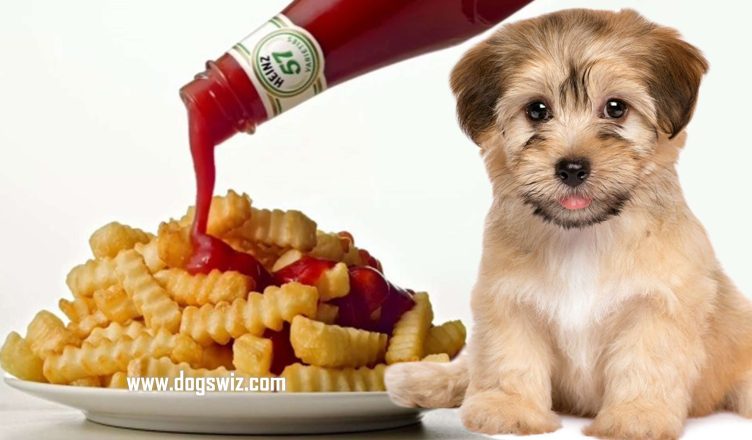Has your dog ever licked the ketchup off your finger after you enjoyed a burger? Probably not, but I am willing to bet my next paycheck that they will. So let’s talk about whether or not your dog can eat ketchup. The answer? It depends. Is the ketchup homemade? Your dog can eat it. Is the ketchup store-bought? Just don’t give it to your dog.
Most commercial ketchup brands are full of artificial colors, flavors, and preservatives that should be avoided by dogs at all costs. But what are the dangers of feeding ketchup to dogs, you ask? Here are 5 reasons why commercial ketchup is bad for dogs:
1. Store-Bought Ketchup Contains an Excess Amount of Salt
Feeding ketchup to your dog might not hurt them today, but if you do it on a regular basis, their health will suffer in the long run. Your dog will experience adverse effects from consuming too much salt if they don’t have enough water in their system to flush out the excess sodium. Ketchup is loaded with excess salt which can cause dehydration, high blood pressure, and heart disease over time. Dogs who are suffering from kidney or liver disease, diabetes, or heart disorders are at an even greater risk. These dogs are more sensitive to sodium buildup especially with the added preservatives that are often found in commercial ketchup.
2. Commercial Ketchup Brands Contain an Excess of Sugar and Other Sweeteners
Since ketchup is basically a mix of tomato paste, syrup, and seasonings, it’s usually packed full of sugar and other sweeteners such as high fructose corn syrup and/or xylitol. These ingredients are not only harmful to your dog’s long-term health, but they can also cause digestive upsets and spikes in your dog’s blood sugar levels. Too much sugar could result in obesity, diabetes, pancreatitis, and other health problems down the road.
3. Some Ketchup Brands Might Contain Garlic and/or Onion Powder
Although the main ingredient in ketchup is basically tomato, some commercial brands include garlic and onion powder in their ketchup. These additives are very harmful to your dog’s health, even in small quantities. In fact, the consumption of garlic and onion powder has been linked to numerous health problems such as anemia, low blood sugar, intestinal upset, and even death. Garlic and onion are toxic to dogs in any form. Even if your dog likes the taste of ketchup, it’s better not to give them, if it contains any of these two ingredients.
4. Commercial Ketchup Contains Preservatives
You might not be surprised to learn that most commercial ketchup brands contain preservatives. These additives are used to prolong the shelf life of the product and they are definitely not safe for your dog’s health. Artificial preservatives are known to cause allergic reactions in both humans and dogs, especially when exposed over a long period of time. Common preservatives that are added to ketchup include sodium benzoate, potassium sorbate, and calcium disodium EDTA.
5. Long-Term Ketchup Consumption Is Linked to Obesity and Heart Diseases
While the occasional treat of homemade ketchup free from any harmful additives is unlikely to cause any harm to your dog, it’s important to remember that too much of anything is never a good idea. In fact, long-term ketchup consumption has been linked to obesity and heart diseases in dogs. Once your dog gets used to the taste of ketchup, there’s a strong chance they’re going to want more of it either on their food or on its own. While homemade ketchup is less likely to cause your dog any harm than commercial brands, it’s still best to avoid treating them with this condiment on a daily basis.
Conclusion
Ketchup is a great condiment for French fries, but if you’ve been wondering whether or not dogs can eat ketchup safely, it’s important to understand that ketchup contains an excessive and unnecessary amount of salt and sugar and may also contain garlic and onion powder which are toxic to dogs. As for preparing homemade ketchup for your dog, it’s always best to avoid the treat unless you’re able to confirm that it’s been prepared without the inclusion of any of the harmful additives that I mentioned above.
Thank you for reading the article.
To explore more, check out our other tomato-related dog articles.
Have you ever given your dog any ketchup? What was their reaction? We’d love to hear from you. Please leave a comment below to let us know!

My dog Shadow eats Ketchup and seems to like them. I don’t want to ruin his happy belly by telling him not to eat it anymore, so I’m wondering if I should continue feeding him store brought ketchup. What should I do?